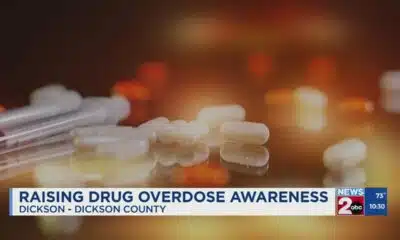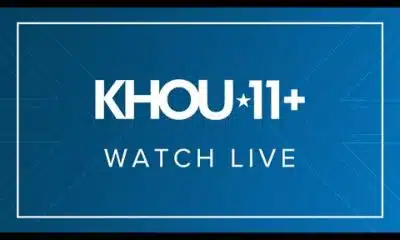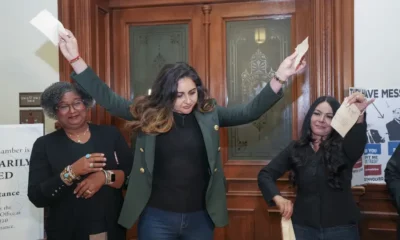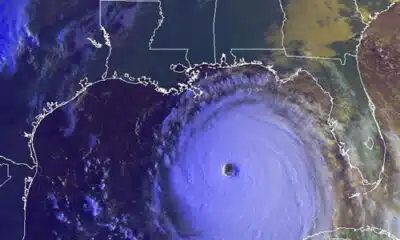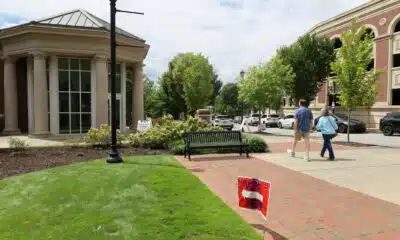News from the South - West Virginia News Feed
Despite research, WV counties refuse to fund harm reduction with opioid funds
by Ty McClung, West Virginia University, West Virginia Watch
July 10, 2025
On a warm summer day in late May, about 100 people are waiting for their turn to go inside the Neighborhood S.H.O.P., located in the annex of Bream Memorial Presbyterian Church on the West Side of Charleston, West Virginia.
Inside the S.H.O.P. — which stands for Showers Healthcare Outreach Program — they will find resources like naloxone, clothing, first-aid supplies, food, showers and people offering services from rental to legal assistance. Director Derek Hudson says the no-barrier organization aids almost 2,000 people a month.
“The whole goal is to have people come in, be heard and know that at least someone is trying to help them,” Hudson said.
The kind of help the S.H.O.P. provides, broadly speaking, is harm reduction.
“Harm reduction for us focuses on meeting people where they are and empowering them with the tools to help prevent negative health outcomes from substance use,” Hudson explained. “Harm reduction, simply put, saves lives.”
What they won’t find inside, however, is one of the most well-known forms of harm reduction: new syringes.
Syringe Service Programs are highly regulated in the state of West Virginia, and service providers say it makes it almost impossible to run one. But SSPs are associated with an approximately 50% reduction in HIV and HCV incidence, according to the Centers for Disease Control and Prevention. They also benefit communities and public safety by reducing needlestick injuries and overdose deaths.
Hudson’s S.H.O.P. has received about $80,000 in state opioid settlement funds from the West Virginia First Foundation specifically to create a re-entry program that will house people who are coming out of incarceration. It’s a program that will reduce recidivism and homelessness in the community, Hudson says, but it is not considered a harm reduction program.
Programs that provide more typical harm reduction in the form of practical strategies that reduce the negative consequences of drug use — which can include anything from free naloxone to wound care — are not receiving any of the tens of millions of dollars coming into state, county and city level government coffers in West Virginia from the 2021 global opioid lawsuit settlement agreement so far, according to an analysis by students from West Virginia University’s Reed School of Media of Freedom of Information Act responses from 50 of the state’s 55 counties. And without those funds, many of the people working to provide these services worry that disease transmission and overdose death rates will buck a national trend and rise in West Virginia once again.
The high cost of a crisis
The funds are the result of a global settlement, agreed to in federal court, of a class action lawsuit brought by states, counties and cities across the country against opioid distributors, manufacturers, pharmaceutical companies and others, in the wake of the country’s opioid epidemic.
According to the Centers for Disease Control and Prevention, more than 720,000 people died from an opioid overdose in the U.S. between 1999 and 2022. West Virginia saw its peak in 2022, when 1,335, or 75 out of every 100,000 people, died of an overdose.
West Virginia will receive about $980 million in total from the settlement agreement, split into payments over 18 years, with larger payments coming up front. The West Virginia First Foundation — a nonprofit created by the state Legislature — will control the spending of 72.5% of the funds, local governments 24.5%, and the West Virginia Attorney General’s Office 3%. A Memorandum of Understanding dictates what the money can be spent on, ranging from law enforcement, prevention education, treatment and recovery to harm reduction.
In 2023, more than $73.5 million of those funds were distributed to county officials in the state’s 55 counties. An analysis of FOIA responses by journalism students at West Virginia University’s Reed School of Media lacks information for five counties, but of the 50 others, Logan County received the highest distribution at $3,983,631, and Jefferson County received the least at $62,773.
Kanawha County, where the state’s capital Charleston is located, received just more than $3.9 million, and, according to County Commissioner Lance Wheeler, is focusing on funding recovery options. But Wheeler says they are also considering funding harm reduction organizations as well.
“This is something I strongly support,” Wheeler said. “We’re going to continue to do that, helping those who have a track record of success and those who are helping people who are struggling.”
The collapse of a program — and the fallout that followed
Harm reduction has a long, complicated history in Kanawha County and Charleston. With a population of 47,000, Charleston is the largest city in the state. It also had the highest overdose rate per capita in the entire country in 2022.
The city health department started a syringe service program in 2015, but was open for just three years before public and political pressure forced the city to shut it down. Then-mayor Danny Jones, a Republican, called the program a “mini-mall for junkies and drug dealers.”
The program’s closure in 2018, however, had dire consequences for public health. HIV and hepatitis rates skyrocketed, eventually requiring CDC officials to travel to Charleston in 2021 to help the city contain the outbreak.
Then-CDC HIV Prevention Chief Dr. Demetre Daskalakis called the outbreak “the most concerning HIV outbreak in the United States.”
The fight for evidence-based and person-first
Iris Sidikman, the harm reduction coordinator at the Women’s Health Center of West Virginia, said the reluctance to fund harm-reduction services has directly impacted organizations that go beyond providing syringe services.
“When you have a tool to give someone in a non-judgmental space, it can open a world of possibilities,” Sidikman said.
In 2024, the Women’s Health Center applied to the Kanawha County Commission for $250,000 in opioid settlement funds twice, first through an online application and again at a public commission meeting. The clinic intended to use some the funds to provide increased naloxone training and education, cover costs related to screening and treatment of HIV and Hepatitis C and to fund a portion of clinical and programmatic staff salaries for the Harm Reduction Program, Sidikman said. Their application was denied without explanation.
The Women’s Health Center also applied with Charleston City Council in August 2023 to create a syringe service program on Charleston’s West Side, but was denied due to fear of an “increase in drug use and crime.”
Research on harm reduction by the Substance Abuse and Mental Health Services Administration has shown that these practices reduce disease transmission and overdose rates, and experts believe politicians should look at the numbers more often.
“What we want to do with data analysis… is to be able to produce the evidence to show to political power that these interventions are working and capable, they are saving many lives,” said RTI International Research and Public Health Analyst Barrett Montgomery.
SOAR WV, another grassroots, Charleston-based harm reduction group, works to promote the health, dignity and voices of individuals who are impacted by substance use disorders, according to its website. SOAR and other organizations picked up the task of providing new syringes until the state Legislature passed Senate Bill 334 in 2021, which included strict regulations for running a syringe service program, such as requiring a West Virginia state ID in order to participate.
The city of Charleston also passed stipulations requiring that each syringe be uniquely labeled for tracking purposes.
As of June 2025, West Virginia Health Right operates the only syringe-service program in Charleston, but according to one source, “doesn’t even begin to make a dent in the problem.”
The political appetite is lacking because of a lack of information around the subject, says Dr. Susan Margaret Murphy, president of the Drug Intervention Institute in Charleston.
“Unfortunately, we are in a political climate where I don’t think research and scientific knowledge necessarily pleads the case. So sometimes it’s got to be kind of a heart-on-the-sleeve storytelling type of approach,” she said.
Stigma and the struggle for support
In neighboring Boone County, Commissioner Brett Kuhn agreed.
The county currently does not have any harm reduction services, and, so far, its three elected commissioners have not spent any of their $2.9 million in opioid settlement funds to provide them.
“I think in a rural setting, you’re going to see more pushback than you would in more of an urban setting,” Kuhn said. “I think with the syringes, it’s like people think we’re subsidizing the drug use, whereas with naloxone the attitude is more like, ‘well, we’re trying to help somebody that’s in trouble.’ And really, if you look at it, in both cases, is there any real difference between the two?”
Kuhn says that informing the public about how harm reduction works and its benefits to the community is key to fighting pushback.
“You’ve got to get out ahead of the curve. You’ve got to get out there and get the information out,” Kuhn said. “I sometimes think we don’t do a good enough job of that.”
Kuhn said his county experienced the brunt of the nation’s opioid overdose epidemic firsthand. Its opioid mortality rate in 2023 was 82.0 per 100,000, the second-highest rate in West Virginia, according to the West Virginia Department of Health and Human Resources.
Instead of harm reduction programs, the county spent its funds on paying off its regional jail bill, supporting a food pantry, a county arrest record-keeping system, a rapid response vehicle for EMTs, and a 25-bed expansion at Hero House, a faith-based sober living home in Madison.
Kuhn and officials in other counties say the vague nature of the state’s MOU overviewing how the money can be spent puts the duty of interpretation on local officials. The county did not hold special community meetings or town halls to gather input on how to spend the funds.
But Kuhn says it’s rebuilding a sense of community that could help garner support for harm reduction services.
“I think it’s sometimes the attitude is ‘well, those people don’t want to help themselves,’” Kuhn said, “[but] if they don’t want to help themselves, then what do I need to do to try to help? And I think in a certain sense, we’ve lost that sense of community, that we’re all in this together.”
Kuhn hopes that can change in the future.
This story was published in partnership with West Virginia University’s Reed School of Media and Communications, with support from Scott Widmeyer.
GET THE MORNING HEADLINES.
West Virginia Watch is part of States Newsroom, a nonprofit news network supported by grants and a coalition of donors as a 501c(3) public charity. West Virginia Watch maintains editorial independence. Contact Editor Leann Ray for questions: info@westvirginiawatch.com.
The post Despite research, WV counties refuse to fund harm reduction with opioid funds appeared first on westvirginiawatch.com
Note: The following A.I. based commentary is not part of the original article, reproduced above, but is offered in the hopes that it will promote greater media literacy and critical thinking, by making any potential bias more visible to the reader –Staff Editor.
Political Bias Rating: Center-Left
This article presents a sympathetic view toward harm reduction programs and critiques the regulatory and political barriers limiting their effectiveness in West Virginia. It highlights the public health consequences of shutting down syringe service programs and emphasizes scientific evidence supporting harm reduction. The tone favors evidence-based, compassionate approaches to drug policy and health crises, implicitly criticizing conservative political opposition, such as the cited Republican mayor’s negative framing of harm reduction efforts. However, it maintains a largely factual reporting style with multiple sourced statements and avoids overt partisan language, placing it in a center-left position focused on public health advocacy.
News from the South - West Virginia News Feed
Veteran outreach returns to Oak Hill
SUMMARY: Veteran outreach services have returned to Oak Hill after a brief pause caused by the retirement of coordinator James Willis. The mobile vet center visits the Oak Hill Church of the Nazarene monthly to assist veterans, but now operates through volunteers without the mobile van. Veteran Tom Tanner, determined to continue support, secured resources from the vet center and arranged monthly meetings, offering services and camaraderie. The program focuses especially on Vietnam-era vets unfamiliar with benefits processes. Events include hot dogs, barbecues, and a welcoming atmosphere fostering unity among veterans. All veterans are encouraged to attend for help or fellowship.
FOLLOW US ON FACEBOOK AND TWITTER: https://facebook.com/WOAYNewsWatch https://twitter.com/WOAYNewsWatch.
News from the South - West Virginia News Feed
Rural Health Transformation Program is woefully inadequate to save West Virginia hospitals
by Ellen Allen, West Virginia Watch
August 28, 2025
As I visit communities around my beloved West Virginia to talk about the impacts and consequences of Capito Care, or HR 1, perhaps the most sweeping and arguably the worst piece of health care legislation to ever come out of our nation’s capital, it is the impact upon rural hospitals that is getting the most attention — and concern.
If you have attended one of the meetings or town halls where I have discussed the dire consequences of the $1.1 trillion in cuts to Medicaid, then you have also heard me discuss the vulnerability of our hospitals. Quite frankly, there is not a single hospital in our state that will not be affected. However, there are 10 hospitals and three nursing homes in our state that are either at high risk for closure or vulnerable to closure. You can find those hospitals and the supporting analysis in Rural Hospital Closures — Sheps Center at UNC Chapel Hill and Federal Medicaid Cuts Would Force Rural Hospitals to the Brink of Closure by Families USA, a national, non-partisan advocate for health care consumers.
These hospitals are not in imminent danger of closure. They will, however, be in danger starting in 2027 as the provider tax, the funding mechanism that helps fund Medicaid, is rolled back and ultimately dismantled.
The $50 billion Rural Health Transformation Program is touted as the solution to saving rural hospitals from the dismantling of the funding mechanism for Medicaid. Perhaps it is better than not having one, but barely. It was a last minute addition to appease the outcry of hospital administrators around the country who foresaw the existential threat of Medicaid cuts to their hospitals.
Here is why the fund is inadequate to meet the moment:
- According to the Congressional Budget Office, the fund will roughly offset only 37% of estimated cuts to Medicaid spending. States will have to make up the difference.
- Half of the funds — $25 billion — will be equally distributed among the states with approved applications (states must apply for these funds) irrespective of the rural population or financial health of the rural hospitals. This approach may not adequately address unique challenges faced by hospitals in states with large rural populations, or greater need of older or sicker populations. This certainly stands out to me as a red flag for West Virginia.
- The $50 billion fund may not be enough to overcome systemic issues, of which West Virginia has many. These include rural hospitals who have been operating on razor thin margins for years, or even negative revenue, declining patient volumes, and workforce shortages.
- West Virginia hospitals serve an older, sicker and poorer population. It is just a fact. Many of our hospitals rely heavily on government payers such as Medicaid and Medicare which reimburse at below cost of providing services.
To add insult to this injury, these funds may not even go to rural hospitals. There is no guarantee. The law says that states should use the funds to pursue goals including improving access to hospitals and other providers, improving health outcomes, enhancing economic opportunity for health care workers, and prioritizing the use of emerging technologies. All good things worthy of funding.
Dr. Mehmet Oz, a President Donald Trump appointee leading Medicare and Medicaid, will determine how to distribute the other $25 billion. The law says the money is to be used for such things as increasing robotics, upgrading cybersecurity and helping rural communities “to right size their health care delivery systems.”
And here is the real kicker, especially given the carrot and stick approach of the Trump administration: The law not only grants the Center for Medicare and Medicaid Services broad discretion over the award and distribution of funds, but these funding decisions are not subject to administrative or judicial review.
What could possibly go wrong? Capito Care is bad policy and it is not ameliorated by a mere $50 billion fund. We urge hospitals and supporting associations to fight for adequate funding to protect health care in their communities.
If these rural hospitals close — and some will —we may never get them back.
Sen. Shelley Moore Capito should revise Capito Care while there is still time, and turn it into legislation she would be proud of. Sen. Jim Justice and Reps. Carol Miller and Riley Moore should join her.
GET THE MORNING HEADLINES.
West Virginia Watch is part of States Newsroom, a nonprofit news network supported by grants and a coalition of donors as a 501c(3) public charity. West Virginia Watch maintains editorial independence. Contact Editor Leann Ray for questions: info@westvirginiawatch.com.
The post Rural Health Transformation Program is woefully inadequate to save West Virginia hospitals appeared first on westvirginiawatch.com
Note: The following A.I. based commentary is not part of the original article, reproduced above, but is offered in the hopes that it will promote greater media literacy and critical thinking, by making any potential bias more visible to the reader –Staff Editor.
Political Bias Rating: Center-Left
This content critiques a Republican-led healthcare proposal, highlighting concerns about Medicaid cuts and their impact on rural hospitals, particularly in West Virginia. It emphasizes the negative consequences of the legislation and calls for revisions from Republican lawmakers, reflecting a perspective that favors stronger government support for healthcare funding. The tone and focus suggest a center-left bias, advocating for more robust public healthcare investment and protections for vulnerable communities.
News from the South - West Virginia News Feed
The Scott Skyhawks look to soar during Jeremy Dolin’s final year as head coach
SUMMARY: The Scott Skyhawks, led by head coach Jeremy Dolan in his final season, aim to continue their football success in 2025. After reaching the second round of postseason play last year, the team faces a rebuilding year, having lost 12 seniors and five All-State players. Despite this, Dolan is confident in returning talent like their second-team All-State quarterback, Mason Brown, and key players Ethan Bo, Thomas Chris, Caden Sharps, and Brian Neal. With a strong senior and incoming freshman class, the Skyhawks are ready to compete with heart and physicality, striving for postseason success in Dolan’s last year coaching.
The Scott Skyhawks reached the second round of the postseason a year ago before bowing out to Roane County. It’s a case of doing some reloading as the 2025 season looms.
FULL STORY: https://wchstv.com/sports/top-sports/countdown-to-kickoff-edition-42-skyhawks-want-to-soar-during-dolins-last-year-as-coach
_________________________________________
For the latest local and national news, visit our website: https://wchstv.com/
Sign up for our newsletter: https://wchstv.com/sign-up
Follow WCHS-TV on social media:
Facebook: https://www.facebook.com/eyewitnessnewscharleston/
Twitter: https://twitter.com/wchs8fox11
Instagram: https://www.instagram.com/wchs8fox11/
-
News from the South - Texas News Feed5 days ago
Racism Wrapped in Rural Warmth
-
News from the South - Missouri News Feed6 days ago
Donors to private school voucher program removed from Missouri transparency site
-
News from the South - Alabama News Feed6 days ago
Child in north Alabama has measles, says Alabama Department of Public Health
-
News from the South - Tennessee News Feed6 days ago
A marsh bird found in Tennessee wetlands is endangered. FWS is drafting a plan.
-
News from the South - Alabama News Feed7 days ago
Wilsonville residents seek preemptive strike against massive data center project
-
News from the South - Texas News Feed6 days ago
Texas Democrats’ walkout prompts GOP retribution
-
Our Mississippi Home6 days ago
After the Winds: Kindness in Katrina’s Wake
-
News from the South - Georgia News Feed6 days ago
Voters head to the polls to pick new metro Atlanta state senator in low-turnout special election



